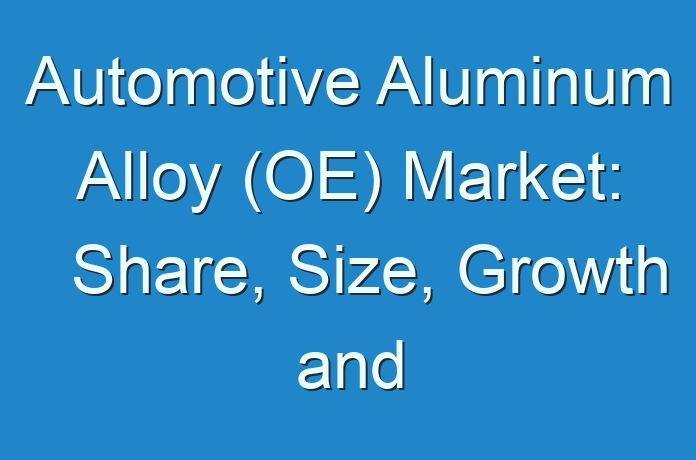
Transparency Market Research has published a new report titled, “Automotive Aluminum Alloy OE Market – Global Industry Analysis, Size, Share, Growth, Trends, and Forecast, 2018–2026”. According to the report, the global automotive aluminum alloy OE market is anticipated to surpass US$ 46 Bn by 2026, expanding at a CAGR of more than 5% during the forecast period.
Aluminum being light in weight is gradually replacing the steel content in automobiles. The usage of aluminum alloy reduces the load on the vehicle and hence, less power is required by the engine to drive the vehicle, which increases fuel-efficiency and reduces pollution. Rising consumer demand for fuel-efficient vehicles is estimated to drive the automotive aluminum alloy OE market.
Increase in level of pollutants in the environment is compelling governments to enforce regulations leading to light weighting of vehicles and reduction of emissions. Europe has raised its average CO2 emission target of 95g/Km by 2024 for passenger vehicles, from its target of 150g/Km in 2015. Therefore, automakers are preferring to adopt light weighting in order to achieve such a significant drop in emission. This, in turn, is projected to boost the demand for automotive aluminum alloy during the forecast period. Aluminum can absorb two times more collision energy than mild steel. Hence, the utilization of aluminum alloy in body panels improves the crash worthiness of the vehicle. The lower weight of the vehicle enabled by utilization of aluminum alloy improves vehicle handling and also reduces braking distance, thus enhancing safety. High demand for pedestrian safety is expected to boost the adoption of aluminum alloy in vehicle body panel parts, which in turn is likely to propel the aluminum alloy OE market
For More Details, Request A Sample Report@ https://www.transparencymarketresearch.com/sample/sample.php?flag=S&rep_id=48450
In terms of application, the body segment is estimated to expand at a significant growth rate during the forecast period. Usage of aluminum body closures such as door panels and hoods is rising even in premium cars. Automakers can utilize more material and improve the dent resistance of the body panel due to the low weight of the material. Luxury car makers such as Jaguar Land Rover have switched from steel to aluminum body-in-white due its light weight and recycling capabilities. Utilization of aluminum alloy for body-in-white structure reduces the vehicle weight by nearly 70 Kg in a passenger vehicle. Adoption of aluminum alloy in body structures and panels by automakers is expected to rise in order to achieve fuel economy and emission targets and hence, the demand for aluminum alloy is expected to rise.
Aluminum alloys are also employed in driveline and engine component products due to their high casting ability. In electric vehicles, light weighting becomes highly crucial due to the additional weight of the battery. Adoption of aluminum alloy in engine components and driveline in plug-in hybrid vehicles and hybrid electric vehicles is expected to rise during the forecast period. Usage of two-stage transmission and direct drives in electric vehicles is a major opportunity for the expansion of the aluminum alloy OE market.
Asia Pacific is expected to dominate the global automotive aluminum market owing to high volume production of vehicles and changing emission norms in China and India in order to achieve Euro 6 equivalent emission norms. High affordability and stringent emission norms in Europe are expected to boost the aluminum alloy OE market in the region.





